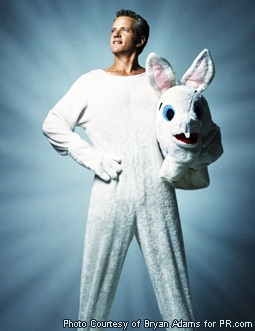
I recently had a lengthy conversation with Dan Mathews, the always passionate, sometimes controversial and never boring Senior Vice President of PETA – People for the Ethical Treatment of Animals. Dan is the brains behind PETA’s provocative celebrity driven anti-fur and vegetarian campaigns that find their way into the headlines on a regular basis, as well as some of the outrageous animal rights protests that scare the pants off of big business, namely any company that tries to get away with mistreating animals.
The high pressure tactics that PETA employs are necessary in a world where PR and spin control are vital to the well being of a company’s image. Businesses are more likely to respond in short order and clean up their act, when their perceived “reputation” is on the line. Dan Mathews has become an expert at using the media and public perception in his efforts to save countless animals from horrendous torture. Since animals don’t have a voice, Dan Mathews has elected to be their international spokesperson. It’s a profound responsibility, but he manages to remain light hearted and jovial.
In Dan Mathews’s 2007 memoir, Committed, he chronicles his many escapades and misadventures when trying to educate people, from all walks of life, about the unnecessary abuse and cruelty that is happening to animals every day in fur factories, dairy farms and meat processing plants around the globe. Over the past twelve years, Dan has found a strong united front with fellow animal rights activist, Pamela Anderson. Together, the two have used Dan’s talent for causing a ruckus, and Pamela’s super stardom to stage a successful two-pronged assault against animal cruelty on every continent. Pamela Anderson told PR.com, “I have traveled the world pushing animal rights with Dan Mathews. I guess you could call Dan my ethical advisor. Bringing him on the road to look for ways for me to speak up for animals makes traveling so much more fulfilling… and fun. There’s never a dull moment when he’s around.”
On what prompted her to start working with PETA, Pamela went on to say, “I’ve been an animal lover my whole life, and I’ve been active with PETA since the mid 1990s. At the time I was making headlines because of the popularity of Baywatch, and I knew that I could use my fame to draw attention to, and to help stop, cruelty to animals.” This alliance wasn’t initiated by PETA courting Pamela Anderson. It was actually the other way around. According to Pamela's recount, “I bombarded PETA with letters until they took me on board! I love the way PETA deals with animal rights in such a strong way.”
Though she admits that some of PETA’s work for animals is an uphill battle, Pamela insists that it is always worth fighting for. “The businesses they fight can be ruthless, so PETA has to stick its neck out to do battle. Animals have absolutely no say, whatsoever, in how they live or how they are treated, because they have no voice of their own. Through PETA, I’m able to speak up for them and help them be heard. My partnership with PETA has definitely been one of the most fulfilling long-term relationships I’ve ever had!”
PR.com (Allison Kugel): What’s going on with PETA (People for the Ethical Treatment of Animals)? What should people know about right this minute?
Dan Mathews of PETA: Our biggest ongoing campaign is targeting KFC (Kentucky Fried Chicken). They still boil birds alive in de-feathering tanks, and they still use such crude gathering methods that they snap the legs and wings of chickens in their gathering process, shoving them into crates. We have been after them, like we were after McDonald’s, Burger King and Wendy’s before them, to upgrade their humane policies and guidelines. We had good luck, and we fought hard and won with McDonald’s, Burger King and Wendy’s, but KFC is dragging their feet. They’re not making any changes. It has been a real, real tough battle. People don’t realize that chickens are exempt from the Humane Slaughter Act. There are some minimal guidelines for pigs and cows, but for chickens it’s anything goes. As a result, KFC gets away with a lot of really horrific cruelties.
PR.com: Why are there no guidelines for chickens?

Dan Mathews of PETA: Because when they passed the Humane Slaughter Act back in the 1960s, the only way they were able to get it through congress was by signing a deal with the poultry trade to exclude them. Birds are small and they didn’t want to have to look out for their welfare. They’re kept in such deplorable conditions, that they made the case back then that if they actually had to look out for chickens’ welfare, they would not be able to make the profits that they wanted. Well, now times have changed and people are wanting to make the case to KFC, as well as to other fast food outlets, that the treatment of animals is of primary importance even for people who are not vegetarians.
PR.com: I think it was in your book (Committed, A Rabble-Rouser’s Memoir) that you were saying that chickens actually have the same amount of intelligence as dogs?
Dan Mathews of PETA: Oh, yeah. Absolutely. This comes from the animal behaviorists. Animal studies that have come out in the last twenty years [show] how fascinating, how evolved and how sophisticated all kinds of animals are. From chickens, to even lobsters who decorate their dens.
PR.com: Why do we consider certain animals’ lives to be sacred, for instance in the United States we’re obviously very protective of cats and dogs, while other animals’ lives are considered dispensable?
Dan Mathews of PETA: I think a lot of it goes back to our upbringing. We grow up looking at TV commercials. From my generation it was TV commercials from McDonald’s where hamburgers actually grew on the hamburger patch. They weren’t from cows. Charlie the Tuna tasted so good and he couldn’t wait to get caught and eaten. And there are other ads that are geared toward kids that make it all seem like fun and games. It was a very interesting experience I had in Colorado, when I was giving a talk to a whole class of third graders. I was invited to talk about the fur issue and one of the kids said, “When we eat meat, do they have to kill animals?” When I said, “Yes they do, and they’re kept in pretty awful conditions,” the kids’ faces just fell. They couldn’t believe it. They looked like they had been lied to, and I’m sure they had been (laughs). Parents, they just avoid this topic altogether. Part of it is because they are led to believe that meat is a healthy thing for their kids to eat. That idea is certainly changing now that we know how bad meat is for us, health-wise. But also, if you’ve got to lie to your kid about something, you should realize there’s something wrong with it. A lot of kids went home that night and refused to eat meat, because they couldn’t believe animals had to die for it.
PR.com: I actually think that a lot of adults are not educated on the specifics of what goes on in the slaughtering and torturing of animals either.
Dan Mathews of PETA: It’s true and I think one of the challenges that PETA has is getting this information and these images to people. One of the great things about the Internet, for us, is that we now have people all over the world who at the click of a button, can look at some of these undercover videos and see what happens inside of a KFC slaughterhouse. [They can] see what happens inside laboratories and circuses. A lot of times people don’t want to see that information, which is why we enlist so many celebrities to host these videos for us online. People looking in Google for a Pamela Anderson video will likely find a PETA one before they’ll find her porno tape (laughs). And, you know, we do all that for a reason.

PR.com: My mother insists on wearing a fur jacket when she walks around New York City. She claims it’s the only thing that keeps her warm. I actually sent her a link from the PETA website that shows what goes into making a fur coat. I said, “I want you to watch this, because once you watch it then you can’t pretend that you don’t know anymore.”
Dan Mathews of PETA: A lot of people, once they do see that information, have a change of heart. Martha Stewart is one great example of someone who used to be a PETA target. She actually took the time to think about it and to look at the information we sent to her about how animals are electrocuted, drown and beaten to death just for some coat that makes you look like Big Foot. She [realized that] it’s just not necessary. It says something about you if you’re that callous that you have to wear something that causes such suffering. One of the biggest media hits that PETA gets every year is our “Worst Dressed Celebrities” list. Among the people who were on it and who have since given up [fur] are people like Alicia Keys, of course Martha Stewart. Christina Ricci sent us a letter saying that it provoked her to think about it, and that she will never wear it again. Eva Mendes wore fur on a red carpet to some event and we sent her a very kind letter with some information. She replied that somebody gave it to her and that she wasn’t really thinking and that she would never do it again. She volunteered for our latest “Rather Go Naked Than Wear Fur” campaign.
PR.com: Obviously you guys get a ton of media attention because you’re very clever and you’ve learned how to work the media. Have you been able to monitor how many results and wins for animal rights you’ve gotten as a result of PETA’s outrageous media tactics?
Dan Mathews of PETA: We monitor it in a few different ways. One of the ways we look is changing attitudes. There was a firm called Label Networks which did an online poll of teenagers to find out which charity group teenagers most wanted to volunteer for. We were thrilled to see that PETA was number one. I think it’s because we redefined the whole animal rights issue for a new generation. It’s looked upon as mainstream in some ways and edgy in other ways. I think it’s edgy because of the tactics we use, things like using sex in our protests. And to see characters on just about every TV show now who are vegetarian or who identify themselves as animal advocates. The other way that we look at our successes is how we’re changing corporate practices and how we’re actually affecting the lives of animals. We have been directly responsible for companies like Gillette, Avon, Revlon and Estee Lauder [not testing] their products on animals. We were able to pressure General Motors to stop using animals in crash tests. One of the most significant victories we’ve had was getting McDonald’s and Burger King to stop buying their eggs from farms that de-beak chickens and keep them in tiny confined cages with no room to even open their wings.
PR.com: For people who don’t understand, explain the purpose of PETA’s various “naked” campaigns and other sexually charged campaigns. What’s the method behind the madness?
Dan Mathews of PETA: We are a charity organization. We don’t have an ad budget to speak of. We’re targeting all these different global industries, and we’re not even a slight drop in the bucket, comparing our resources to their resources. So, our only currency is public pressure and public opinion. We’ve had to, over the years, figure out a way to fine tune our protests so that with minimal expense on our part, we can really focus the world’s attention on these issues. Back in the sixties you had to get hundreds or thousands of people together for a protest march so that there would be some media interest. Well, today all you have to do is have a few people that take their clothes off and you’ve got everyone’s attention (laughs)! Because we have such a full agenda, we’ve had to be very creative in trying to adapt all of our campaigns into ways that will attract as much public attention as possible. That’s our currency. Our currency is being obnoxious. The public finds a lot of our campaigns titillating or annoying, but the companies that we target find them very threatening. They don’t want to have protesters outside their shareholder’s meetings. They don’t want to, like Donna Karan did a few weeks ago, find a PETA member in their actual apartment (laughs)!
PR.com: You guys are good at that. You dress in costumes to sneak into places. Didn’t you pretend to be a priest at a fashion show?
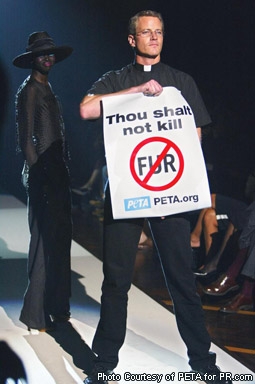
Dan Mathews of PETA: Yeah. We have to figure out ways to get past security. One of my favorite things that we do is let our adversaries organize an event. Let them spend hundreds of thousands of dollars on a fashion show, getting celebrities to it and media from around the world to it. Then, let’s just get a few people in to crash the thing, and turn it into our event, and make them realize that if they abuse animals they will run the risk of having their own events be totally hijacked by us.
PR.com: (Laughs) With the influx of web traffic that you get after these publicity stunts, how many translate into people becoming PETA members and actually donating or becoming actively involved?
Dan Mathews of PETA: It depends on the campaign and the issue. Certainly with the issue of vegetarianism, people know that there’s something wrong in slaughterhouses. More and more now, as the message has been repeated year after year, people are caring about these things and coming to our site and ordering vegetarian starter kits. Especially among young people who realize that they don’t have to meet the same fate as their grandparents, and die of a heart attack. They can be a vegetarian, not just for the animals, but for their health.
PR.com: Why do you think some people are sensitized to the plight and suffering of animals, while a lot of people just don’t make the connection or have that same compassion?
Dan Mathews of PETA: We have this sense of entitlement, and that success means having the convenient choice to do anything and everything that you want. And anytime somebody tries to limit your choices, they are a bastard and they are infringing on your life. I think it’s a very selfish attitude and it affects some people more than others. And I think there are other people who are just a little bit more sophisticated and a little bit more intelligent, who can see that life is about living and learning and evolving, and being open to education and changing your ideas.
PR.com: Which celebrity campaign has generated the most interest in PETA and why do you think that particular celebrity, or campaign tactic, resonated with the public?
Dan Mathews: It’s interesting, but the campaign that actually generates the most web traffic is not necessarily campaigns we do with celebrities like Pam Anderson or Alicia Silverstone, which was huge. It’s often ones in which we target celebrities. It’s when we release our “Worst Dressed Celebrities” poll. It’s a scathing critique of celebrities who wear fur or animal skins. People love the snarkiness. I think that also is what gives PETA an edge, the fact that we’re not just partnering with celebrities, but that we actually target celebrities. I think it shows that we are a group with backbone, and a group that drives itself forward, rather than depending on the whims of whoever our supporters are.
PR.com: The main argument that I hear from people when the topics of not wearing fur or not eating meat comes up is “I’m just one person. If I were to give that stuff up, would it really make a dent or accomplish anything?” Or I hear, “The cow is already dead,” or “The fur is already on the coat?” What do you say to people who feel that changing their behavior won’t make a difference? And how does it make a difference?
Dan Mathews: It does make a difference because it’s just like people voting. That same argument can be used by people who don’t want to vote.
PR.com: And it is.
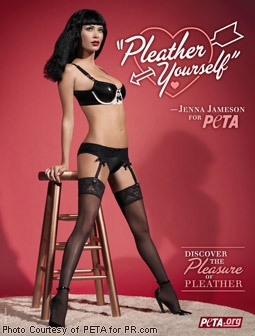
Dan Mathews: It is, of course. You want to put yourself on a path where you leave the world a little bit less repulsive than the one you were born into. We all have to make decisions everyday about lifestyles that we want to lead, things we want to eat, whether we want to be healthy or whether we want to be sick… it all comes down to our own decisions. When you make a decision that is cruelty-free for animals you are invariably making decisions that mean better health for yourself, as well. If people don’t care about their own health, a lot of people care about the environment now. The meat trade is the number one polluter on the planet! It’s the reason why our rivers and streams and bays look like sewers now, as opposed to the Caribbean. It’s because of all the run off from factory farms. I think when people realize the big picture, there’s no good reason to eat meat anymore.
PR.com: Did Al Gore’s film (An Inconvenient Truth) have anything about the animal trade?
Dan Mathews: Nothing whatsoever. His family goes back a [long way] with cattle ranching. We’ve been prodding him to make statements about it, but he has not. He would look a lot better if he was vegetarian (laughs).
PR.com: (Laughs) And didn’t you lose a lot of weight back when you became vegetarian?
Dan Mathews: Yeah. I used to be fat enough to be called Shamoo in swimming class (laughs) and after I went vegetarian when I was sixteen, I dropped forty pounds in about a month and a half, and I never gained it back. I didn’t do it for that reason, it just happened.
PR.com: How does PETA gather its intelligence, as far as what different companies are up to, and which companies are practicing cruelty towards animals?
Dan Mathews: We have a corporate affairs department that basically engages any company that tests their products on animals and any company that uses fur, leather or wool. We do Freedom of Information Act requests on any University or other laboratory that gets government funds to do animal experiments. We have an impeccable research department and we look at all the information, and that’s how we pick our targets.
PR.com: If you contact a company to ask for their records, do they have to disclose that information to you?
Dan Mathews: They don’t, but sometimes we will get [company] stock given to us by people who have a share in certain companies. Then we can raise the issue with shareholders. With a lot of the companies that are publicly traded, the information is pretty easy to find out, at least the basic information. Sometimes for the specific information, it takes a little more digging.
PR.com: How do these companies (some of PETA’s latest targets include: Mars Candy, Burberry and Kentucky Fried Chicken) respond to the negative publicity? Do you get a phone call from their PR rep?
Dan Mathews: A lot of times they don’t respond at all. They just try to dig their head in the sand. Other times they will call, and the responsible ones will engage us and try to look at their policies and see exactly how they can replace them. That happened with Colgate, for instance. Pamela Anderson mentioned on [Live with Regis and Kelly] that Colgate was still testing on animals. That afternoon the head of Colgate-Palmolive called PETA. They flew down here within a few weeks and met with us to look at what tests they could legally replace, instantly, that were not required by law. It’s great when companies are willing to do that.
PR.com: How significant has Pamela Anderson been to your efforts? It seems like she’s been your lucky penny.
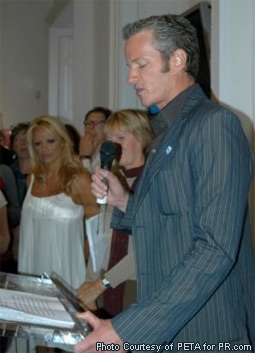
Dan Mathews: Yes she really is. Pamela has redefined what a celebrity can do for a cause. She’s amazed that there’s so much interest in her. She wrote us a letter back in her Baywatch days, [saying] that she really would love to divert the attention to animal rights and that she’d been a PETA member since she was a kid, and she wanted to join forces. Ever since that day in 1996, we’ve been working very closely.
PR.com: I think that’s pretty wonderful that she had the insight to say, “I have this spotlight on me. I’m going to divert the attention to something positive.”
Dan Mathews: There’s been a lot of sex symbols that have come and gone and had a brief time in the sun. Pamela, who never really gave much thought about the impact being such an aggressive animal rights activist might have on her public image or her career, she’s never really thought twice about it. She’s the one who’s endured more than anybody. It’s really quite something.
PR.com: You spoke a lot in your book about being arrested in many different countries during various protests. Since becoming Vice President of PETA, how many times have you been arrested throughout your career?
Dan Mathews: I stopped counting at twenty. I’ve been arrested going back to the seventies in different protests.
PR.com: What were some of the charges?
Dan Mathews: I’ve been arrested for illegal entry, disorderly conduct, loitering, indecent exposure, racketeering…
PR.com: Racketeering?!
Dan Mathews: Yeah, for pressuring a company to stop buying wool from Australia, where they mutilate the animals. I don’t look so good on paper, but when you see what the purpose of these actions were, it’s clear that it’s just to make these companies who don’t want to take these things seriously, sit up and pay attention.
PR.com: Since you’ve worked and campaigned all over the globe, how do you find peoples’ attitudes towards animal rights in different cultures? Have you found there to be one country in particular that is very open to and sensitive towards animal rights?
Dan Mathews: England is definitely the pioneering country for animal rights. They have been a pioneering country in a lot of social change. When you look at where animal rights is spread in the world, it is invariably in countries where they have embraced women’s rights, gay rights and other civil rights. Animal rights is kind of the final frontier in social evolution, I think. Australia has also got a very advanced attitude about these things, especially among younger generations.
PR.com: PETA headquarters is in Virginia, so I’m assuming that there’s a connection in wanting to be in close proximity to Washington D.C.
Dan Mathews: Actually, we’re about three hours away from Washington. We used to be in D.C. but for budgetary reasons - we always meet the Better Business Bureau’s highest ranking among charities for the amount of money that goes into programs, versus overhead - we moved out here to Norfolk, Virginia about twelve years ago.
PR.com: Does PETA have lobbyists, or do you present issues before congress?
Dan Mathews: We try to look for bills and try nurture bills that are good for animals. We don’t get involved in any electioneering. But, we do promote different legislation or fight legislation sometimes, depending on what it’s set up to do. Right now there’s a proposed ban on carriage horses in New York that we are very actively promoting. There have been so many hideous accidents. Horses have their faces in exhaust fumes all day long, they work in all weather extremes and have no room to even extend their legs in the stalls they’re kept in overnight.
PR.com: Where did human beings get the idea that animals are ours to use and abuse as we see fit?
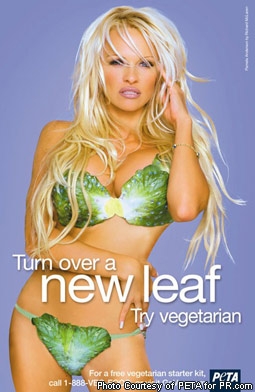
Dan Mathews: I think it’s the same callous attitude that created slavery and that made slavery acceptable for so many hundreds of years. I think that a lot of people have this odd inferiority complex where they have to show, or demonstrate that they are superior to something else. I think that’s one of the reasons why people beat women or beat their kids or beat animals. It’s one of the attitudes that allow these industries to flourish, that they’re just animals. It’s a pretty pathetic outlook, but I think it’s an outlook that has become so entrenched in our culture, especially in the western world. It’s taking a long time to move away from it.
PR.com: How do you think PETA can ever succeed against the cattle industry and dairy farmers who will continue to fight tooth and nail to preserve their livelihood? If the hope is to eventually have a cruelty-free society, how do we reconcile that with those people who make their living that way?
Dan Mathews: One of the reasons I studied ancient history is to really recognize how easy it is for society to move away from certain industries once they realize that they are outdated or cruel. The world is constantly spinning towards the future and trying to pretend, at least, that it’s more sophisticated and more evolved and that people feel like they’re living in a better world than the one their parents lived in. I think as long as people realize that, they can see that these industries can go the same way that the slave trade went. It used to be that industries used child labor and it was quite commonplace in the early part of the [twentieth] century. And that was finally outlawed. If people don’t care about animals, when they see what a sewer our planet is becoming because of all the animal waste, I think that will be another driving factor for people to move away from a meat based diet. There’s so much writing on the wall… the health concerns, the environmental concerns and of course, the animals suffering.
PR.com: Which current Presidential candidate do you think would be most likely to support animal protection laws, or show interest in bills regarding animal welfare issues?
Dan Mathews: We aren’t allowed to endorse a candidate at all, because we’re a non-profit. But, I think of all the candidates out there now, I know Barack Obama has the most wonderful ideals about so many different issues. But, I love the fact that Chelsea Clinton is an ethical vegetarian. People are so influenced by their kids, so I quite like the idea of an ethical vegetarian having two feet in the White House.
PR.com: With the film The Secret and the book A New Earth, there is more of a movement away from organized religion and materialism, and more towards spirituality. Do you think this newly embraced attitude and a movement towards vegetarianism can kind of go hand in hand?
Dan Mathews: Definitely! I think it’s all about realizing what our place is in the world, and realizing that our choices have a direct effect on animals if we chose to eat meat, and if we choose to wear [fur] and leather. It’s a matter of realizing, and pardon the expression, but the bad vibes that are all around your house when you have these cruel products. I think those who are exploring spirituality need to realize that they themselves are causing a lot of suffering that can be easily avoided through other choices. I think it goes hand in hand with that line of thought.
For more information and to learn how you can become involved visit www.peta.org and for Dan Mathews’s book tour dates and cities for the paperback version of his book, “Committed,” visit www.myspace.com/dismalswampthing.
